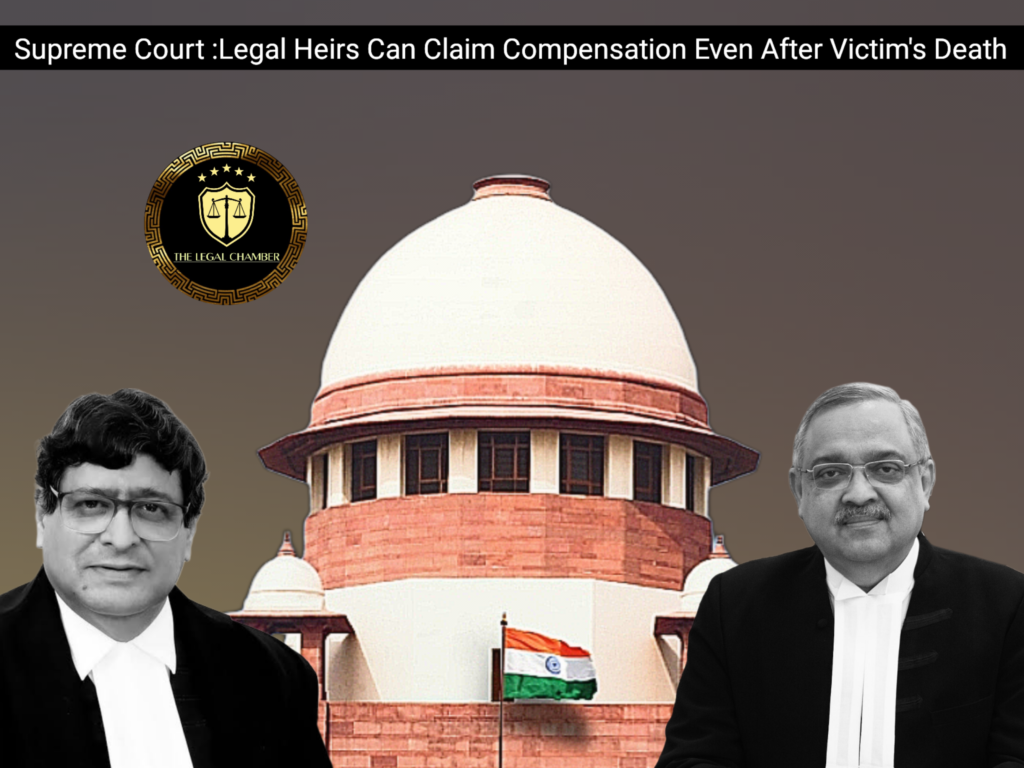
The Supreme Court upheld that legal heirs of a deceased accident victim can pursue compensation for losses incurred during the victim’s lifetime, treating it as part of the victim’s estate. Relying on Oriental Insurance Co. v. Jasmail Singh Kahlon, the Court affirmed that compensation for disability, pain, and future treatment survives the victim’s death. It enhanced the awarded amount, applying a 110% multiplier to income loss and granting additional sums for medical expenses and non-pecuniary damages, ensuring the heirs receive the rightful estate. The judgment reinforces the principle that motor accident claims extend beyond the victim’s lifetime if the cause of action accrued while alive.
Facts Of The Case:
In 2005, Meena, a 50-year-old woman, suffered 100% disability in a bus accident. She filed a claim before the Motor Accidents Claims Tribunal, which awarded her Rs. 8,56,970/- as compensation, covering medical expenses (Rs. 1,68,970/-), loss of income (Rs. 4,60,000/-), attendant charges (Rs. 1,20,000/-), and other damages. The High Court later enhanced the compensation marginally by adding Rs. 50,000/- for pain and suffering and Rs. 1 lakh each for loss of amenities and future treatment. However, Meena passed away in 2024 during the pendency of the appeal before the Supreme Court. Her legal heirs—her husband and two daughters—were substituted as appellants, seeking further enhancement. The Supreme Court, relying on Oriental Insurance Co. v. Jasmail Singh Kahlon, ruled that legal heirs could pursue the claim as it pertained to the “estate” of the deceased, encompassing losses suffered during her lifetime. The Court recalculated compensation, applying a 110% multiplier to her assumed monthly income of Rs. 3,000/- (totaling Rs. 5,14,800/-) and granted additional amounts for future treatment (Rs. 2 lakh) and non-pecuniary damages. The total compensation was raised to Rs. 12,53,770/-, payable to her heirs. The judgment clarified that claims for disability and related losses survive the victim’s death, ensuring rightful compensation for the family.
Procedural History:
The case originated when Meena filed a claim before the Motor Accidents Claims Tribunal (MACT) seeking compensation for injuries sustained in a 2005 bus accident. The Tribunal awarded her Rs. 8,56,970/-, covering medical expenses, loss of income, attendant charges, and other damages. Dissatisfied with the amount, Meena appealed to the High Court, which marginally enhanced the compensation by adding Rs. 50,000/- for pain and suffering and Rs. 1 lakh each for loss of amenities and future treatment. Following Meena’s death in 2024 during the pendency of the case, her legal heirs pursued the matter before the Supreme Court via a special leave petition (SLP). The Supreme Court, after granting leave, examined the claim’s maintainability and recalculated the compensation. Relying on precedent, it affirmed that legal heirs could continue the claim for losses accrued during the victim’s lifetime. The Court enhanced the total compensation to Rs. 12,53,770/-, directing the insurer to disburse the balance to the heirs within two months, thereby concluding the 19-year legal battle.
READ ALSO: Supreme Court Landmark Settlement : Order Caps Pending Debt at ₹15 Lakhs in Mortgage Case
Court Observation:
In its judgment, the Supreme Court made several key observations. It affirmed that the legal heirs of a deceased accident victim are entitled to pursue compensation for losses incurred during the victim’s lifetime, treating such claims as part of the victim’s estate. The Court relied on Oriental Insurance Co. v. Jasmail Singh Kahlon to emphasize that compensation for disability, pain, suffering, and future treatment survives the victim’s death, as these losses form part of the estate inherited by legal heirs. The Bench noted that while the Tribunal and High Court had accepted the 100% disability assessment, the compensation awarded was inadequate, particularly for non-pecuniary damages. The Court recalculated the loss of income by applying a 110% multiplier to the victim’s assumed monthly earnings of Rs. 3,000/- and granted additional sums for future medical treatment and attendant care. It underscored that prolonged suffering (19 years in a vegetative state) warranted enhanced compensation, ensuring justice for the victim’s family. The judgment clarified that motor accident claims are not extinguished by the victim’s death if the cause of action arose during their lifetime.
Final Decision & Judgement:
The Supreme Court allowed the appeal and enhanced the total compensation from Rs. 8,56,970/- to Rs. 12,53,770/-, directing the insurance company to pay the balance amount to the legal heirs within two months. The modified compensation included Rs. 5,14,800/- for loss of income (calculated at 110% of the assumed Rs. 3,000 monthly income over 13 years), Rs. 2,00,000/- for future treatment, Rs. 1,00,000/- each for pain and suffering and loss of amenities, along with previously awarded amounts for medical bills, attendant charges and other expenses. The Court ordered equal distribution among the legal heirs through online transfers to their respective accounts, with applicable interest as per the Tribunal’s original order. The judgment reaffirmed that compensation for accident-related disabilities constitutes part of the victim’s estate that survives death, ensuring the family received just recompense for the 19 years of suffering endured by the deceased victim. All pending applications were disposed of accordingly.
Case Details:
Case Title: Meena (Dead) represented through LRs. vs. Prayagraj & Ors. Citation: (2025) INSC 820 Appeal Number: Special Leave Petition (C) No. 12187 of 2019) Date of Judgment: July 14, 2025 Judges/Justices: Justice K. Vinod Chandran & Justice Sudhanshu Dhulia
Download The Judgement Here